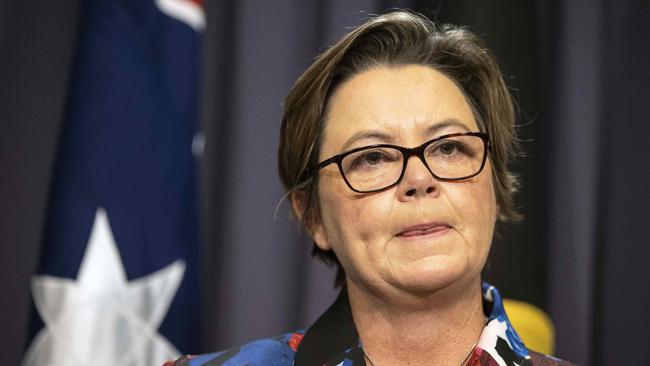Labor promises to keep hands off miner and farmer fuel tax credits
Resources Minister Madeleine King has told business chiefs that fuel tax credits won’t be touched amid industry fears that miners, farmers and heavy industry sectors could cop higher taxes.

Resources Minister Madeleine King has told mining and business chiefs the Albanese government would not touch fuel tax credits amid industry fears Labor could overhaul the scheme shielding miners, farmers and heavy industry sectors from higher taxes.
The Australian can reveal Labor’s top-ranking West Australian MP reassured industry bosses at a meeting in Perth last Thursday that the Albanese government would not take away fuel credits that have been in place for decades.
The government, under pressure from the Greens and left-wing think tanks to scale back or abolish credits for miners, last year shaved $1.1bn off projected fuel tax credit expenditure by raising the heavy vehicle road user charge.
After Anthony Albanese last week overhauled stage three tax cuts, Peter Dutton on Tuesday warned farmers and miners at a Perth mining summit that they might lose the credits and be forced to pay a road tax for “vehicles and machinery that don’t even use public roads”.
With lithium and nickel miners hammered by lower prices and market volatility, Ms King convened a roundtable in Perth last week to assure WA business leaders that the government had their backs.
Senior Labor strategists are increasingly concerned about losing seats in WA, after hitting a high-water mark at the 2022 election that delivered the Prime Minister majority government.
ALP operatives believe several seats are under threat as voters in the powerhouse mining state grow increasingly dissatisfied with the government.
During the meeting, industry chiefs concerned about Labor’s IR changes, onerous red tape and Australia’s high tax environment were reassured by Ms King that the government would not go after fuel tax credits.
Ms King, who was visiting a steel mill in South Korea on Thursday, told The Australian the “government has no plans to cut fuel tax credits” and was actively supporting investment in mines and minerals processing.
“The Albanese government acknowledges we will need more mining, not less, to meet the challenges of the net zero transformation. We will continue to support investment in new and existing mines and minerals processing, including through financing facilities,” she said.
Fuel tax credits, available in various forms since 1957, were listed among the top 20 most expensive programs in the 2023-24 budget.
Treasury projects expenditure will increase from $9.6bn this financial year to $11.2bn in 2026-27.
The 2023-24 budget increased the heavy vehicle road user charge rate from 27.3c to 32.4c per litre, which is estimated to save fuel tax credits expenditure by $1.1bn over four years.
Fuel tax credits ensure businesses across agriculture, minerals, construction, tourism, fisheries and manufacturing are not disadvantaged in the global market by paying road taxes for diesel and other fuels used for machinery and vehicles that don’t use public roads.
Adam Bandt said the government should “divert fuel subsidies wasted on fossil fuel giants towards renewables and EVs, which would in turn boost sectors like lithium”.
“This would help us move off dirty technologies and build up local jobs. The best way to support lithium and rare earth mining is to accelerate the transition away from dirty fossil fuels,” the Greens leader said.
Minerals Council of Australia chief executive Tania Constable said the fuel credit scheme was “commonsense taxation policy that acknowledges that diesel vehicles, machinery and equipment not used on public roads should not pay the diesel road tax”.
“Meddling with the fuel tax credit scheme in any form would be equivalent to raising taxes on over 180,000 businesses, large and small, including farmers, miners, manufacturers, builders, and tourism, transport and seafood operators,” Ms Constable said.




To join the conversation, please log in. Don't have an account? Register
Join the conversation, you are commenting as Logout